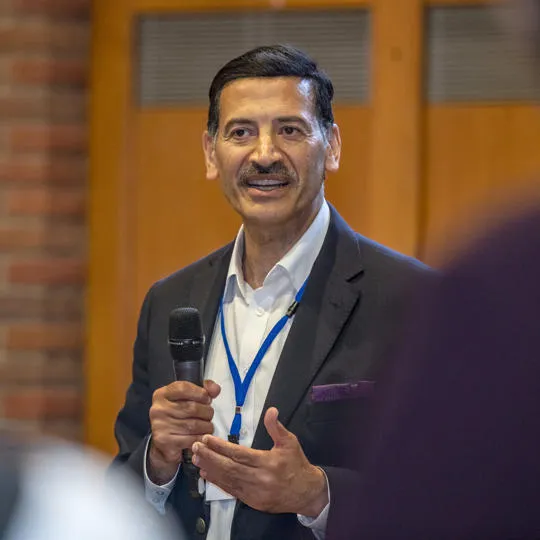To solve complex global problems, we need to combine expertise from different disciplines which is why King’s vision supports multidisciplinary and interdisciplinary approaches to our research. Creating these two new institutes will enable King’s academics and researchers to work together with our partners to advance our knowledge around these important global challenges.
Professor Bashir M. Al-Hashimi, Vice President (Research & Innovation).
16 September 2024
King's draws together expertise to make the world healthier and advance our understanding of intelligence
Two new multidisciplinary research institutes have been created at King’s to help tackle major challenges for society and find innovative ways to advance knowledge.

King’s has launched new multidisciplinary research institutes to bring together expertise from across King’s and its partner organisations to help address complex global challenges.
The King’s Human and Synthetic Minds Institute and the King’s Population Health Institute are part of King’s overall vision which place multidisciplinary and interdisciplinary connections at the heart of its strategic ambitions.
The King’s Human and Synthetic Minds Institute aims to build a stronger scientific, historical, social and cultural understanding of intelligence. It will offer a distinctive interdisciplinary approach that integrates neuroscience, physics, engineering, humanities, and arts to explore human and artificial intelligence and creativity in novel ways.
Drawing on the latest research in biology and computing, it hopes to bring about economical, educational and societal advances through technological, cultural and therapeutic endeavours. It also wants to use neuroscientific discourses and practices to help improve understanding of human creativity, as well provide the inspiration for engineering energy-efficient and reliable computing platforms.

The institute will be led by Professor Federico Turkheimer, of the Institute for Psychology, Psychiatry & Neuroscience, along with co-directors Professor Fay Bound Alberti, of the Faculty of Arts & Humanities, Professor Sandrine Thuret, of the Institute for Psychology, Psychiatry & Neuroscience, Professor Bipin Rajendran and Professor Anatoly Zayats, of the Faculty of Natural, Mathematical and Engineering Sciences.
Through the universal language of mathematics and the evocative power of storytelling, by bringing together expertise from many different disciplines, we want to advance our understanding of how intelligence and creativity determine who we are, what it means to be human and shape our world.
Professor Federico Turkheimer, Director of the King’s Human and Synthetic Minds Institute
The King’s Population Health Institute is dedicated to tackling health inequalities through developing a new model of precise and personalised health.
Our aim is to improve health outcomes through a twin-track approach of innovative, personalised care at the same time as transforming the way we manage chronic disease. We will establish a learning health system and a living population health laboratory, leveraging amongst others AI and health data science to provide high-value care that is efficient, effective, and equitable.
Professor Josip Car, Director of the King’s Population Health Institute.

The institute will be led by Professor Josip Car, of the Faculty of Life Sciences & Medicine, along with co-directors Professor Matthew Hotopf, of the Institute for Psychology, Psychiatry and Neuroscience and Professor Irene Higginson, of the Florence Nightingale Faculty of Nursing, Midwifery & Palliative Care.
The institute will bring together academics from their faculties as well as from King’s Business School, the Faculty of Natural, Mathematical & Engineering Sciences, the Dickson Poon School of Law, the Faculty of Arts & Humanities and the Faculty of Social Science & Public Policy.
It will also draw on expertise from other organisations, including King’s Health Partners and the NHS South East London Integrated Care Board, and collaborate globally with the World Health Organisation on health workforce transformation, leading health systems in countries such as Denmark, Netherlands and Singapore who face similar challenges, and on digital & AI innovation with multiple industry partners.
In this story
Related departments
- Faculty of Natural, Mathematical & Engineering Sciences
- Institute of Psychiatry, Psychology & Neuroscience
- Florence Nightingale Faculty of Nursing, Midwifery & Palliative Care
- Faculty of Arts & Humanities
- Faculty of Life Sciences & Medicine
- Faculty of Social Science & Public Policy
- The Dickson Poon School of Law
- King’s Business School
- King’s & London









